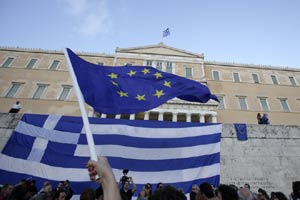Greek banks and the stock exchange will be shut on Monday after creditors refused to extend the country’s bailout and savers queued to withdraw cash, taking Athens’ standoff with the European Union and the International Monetary Fund to a dangerous new level.
Greece’s banks, kept afloat by emergency funding from the European Central Bank, are on the front line as Athens moves towards defaulting on a 1.6 billion euros payment due to the International Monetary Fund on Tuesday.
The ECB had made it difficult for the banks to open on Monday because it decided to freeze the level of funding support it gives the banking system, rather than increasing it to cover a rise in withdrawals from
worried depositors.
Amid drama in Greece, where a clear majority of people want to remain inside the euro, the next few days present a major challenge to the integrity of the 16-year-old euro zone currency bloc. The consequences for markets and the wider financial system are unclear.
The head of Piraeus Bank said banks would be shut on Monday while a financial industry source said the Athens stock exchange would not open.
“It is a dark hour for Europe…. nevertheless from where we’re sitting we have a clear conscience,” Greek finance minister Yanis Varoufakis said. Asked whether Greece would close banks and impose capital controls he said: “This is a matter that we’ll have to work overnight on with the appropriate authorities both here in Greece and (with the ECB) in Frankfurt.”
Prime Minister Alexis Tsipras will meet with his cabinet at 1700 GMT on Sunday. Varoufakis and Central Bank Governor Yiannis Stournaras said there would be announcements afterwards.
Greece’s left-wing Syriza government had for months been negotiating a deal to release funding in time for its IMF payment. Then suddenly, in the early hours of Saturday, Tspiras asked for extra time to enable Greeks to vote in a referendum on the terms of the deal. Creditors turned down this request, leaving little option for Greece but to default, piling pressure on the banking system.
The creditors want Greece to cut pensions and raise taxes in ways that Tsipras has long argued would deepen one of the worst economic crises of modern times in a country where a quarter of the workforce is already unemployed.
Many leading economists have voiced sympathy with Greece’s argument that further cuts in spending risk choking off the growth which would give Greece some prospect of servicing debts worth nearly twice its annual national income.
IMF ready to provide assistance: Christine Lagarde
The International Monetary Fund is carefully monitoring the unfolding financial crisis in Greece and neighbouring countries, and is ready to provide assistance “as needed,” managing director Christine Lagarde said on Sunday. Lagarde expressed disappointment that talks broke down on Saturday between Athens and its creditors, but said she believed the euro zone was in a “strong position” to respond to the crisis. “The coming days will clearly be important,” Lagarde said.
(With PTI inputs)
